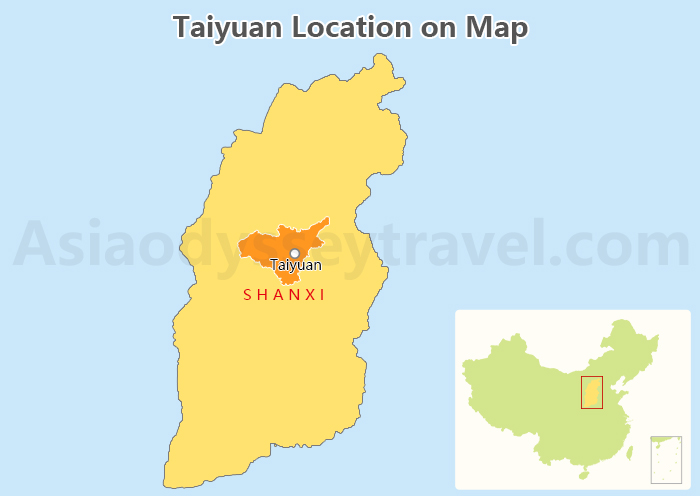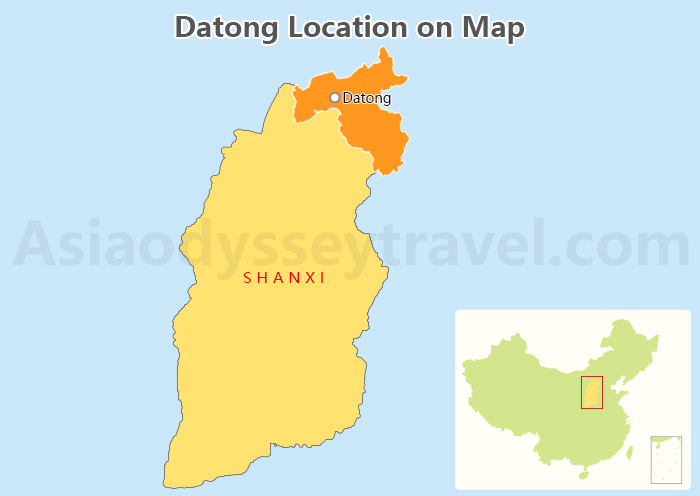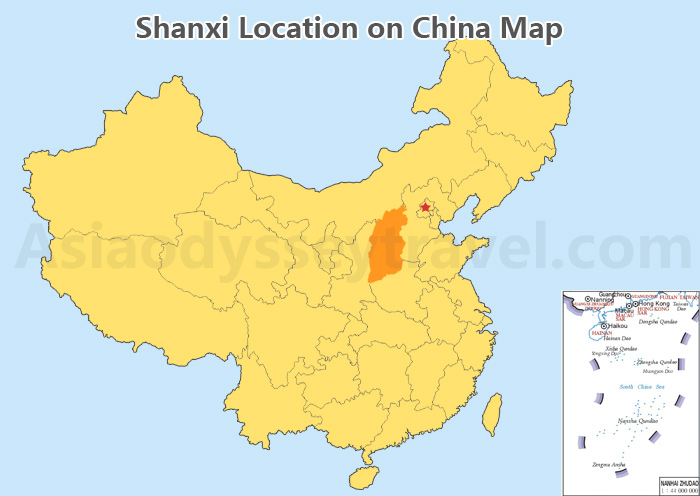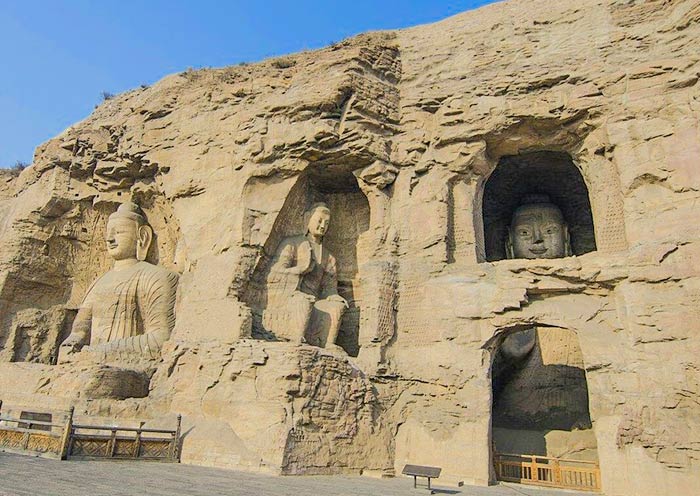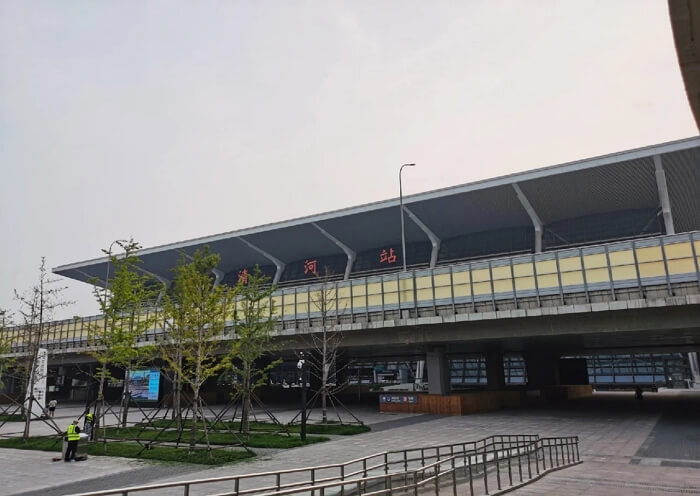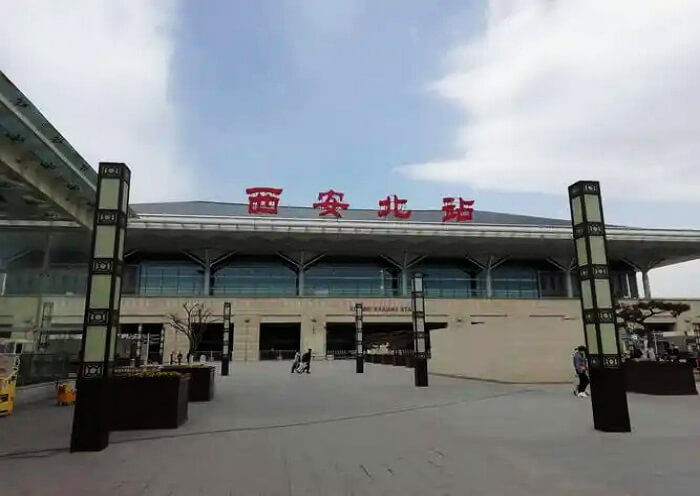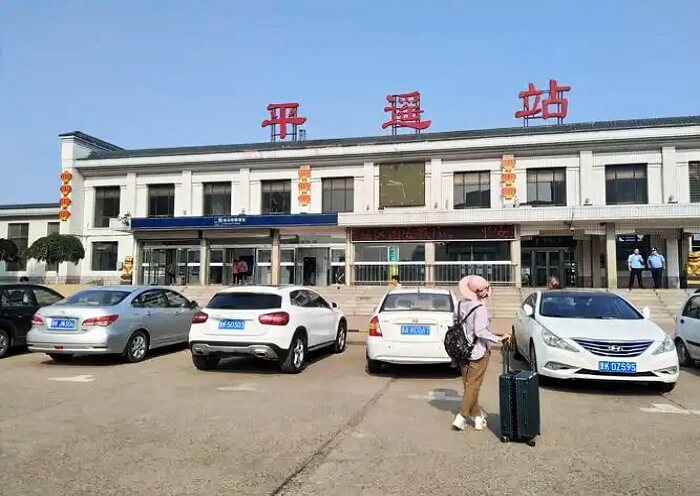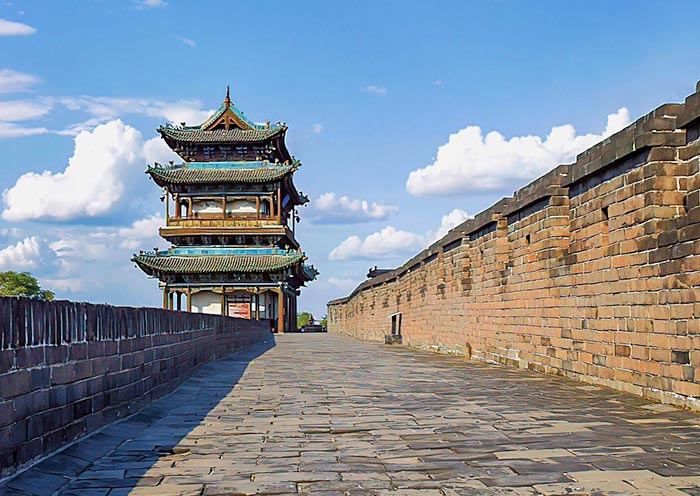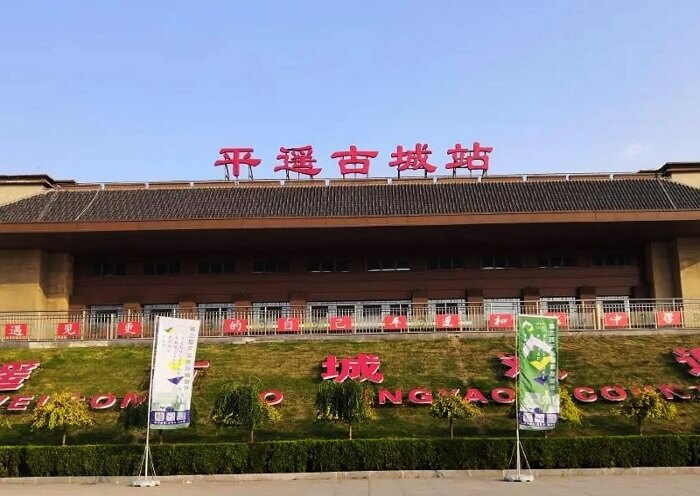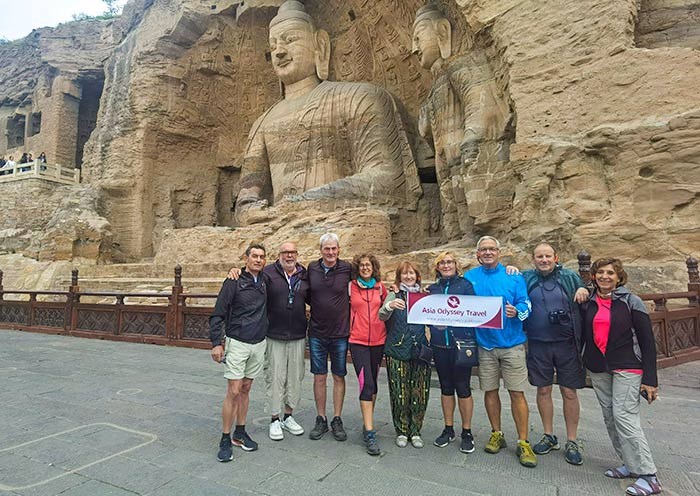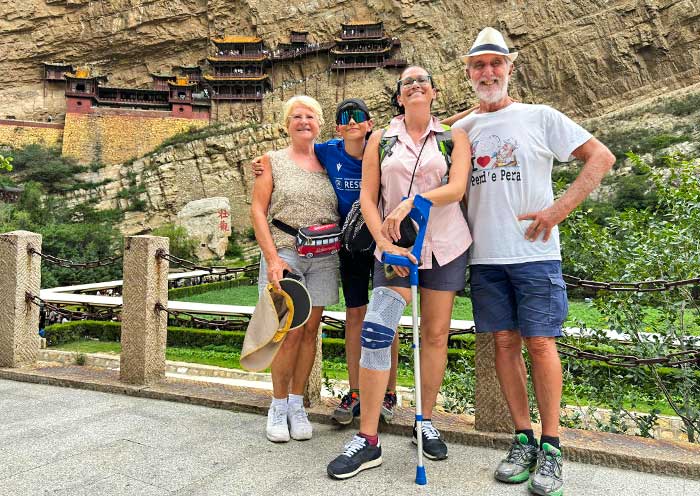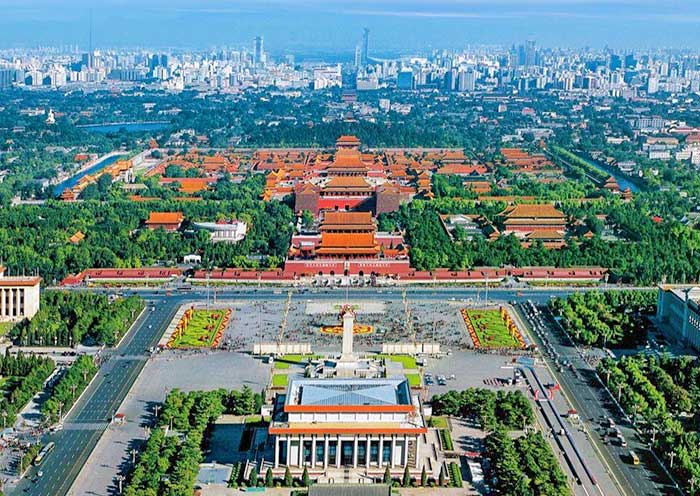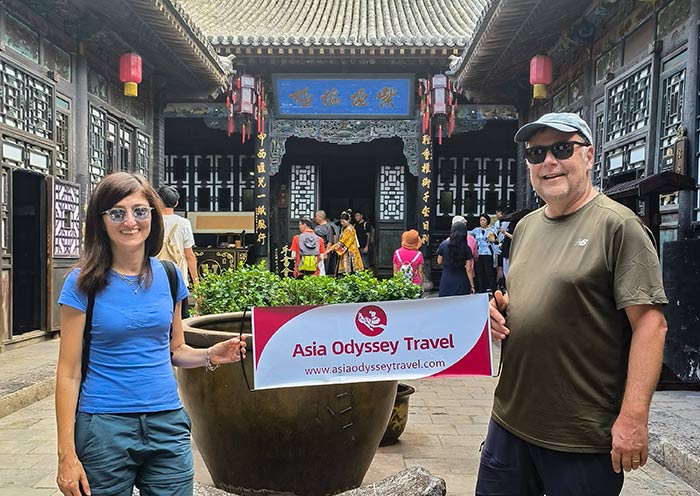Truths of Shanxi Travel
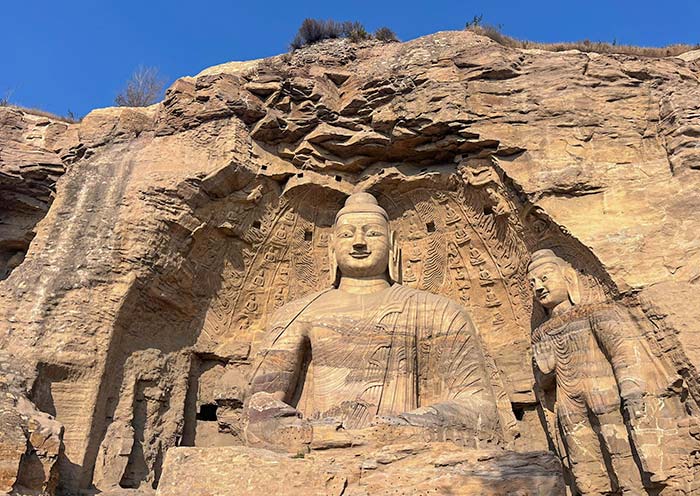

Location: the northern part of China.
Short Name: Jin
Geographic Area:156,700 square kilometers (Shanxi = 99 Londons or 72 Tokyos).
Weather: mild spring and autumn, wet summers, cold winters, and persistent, dry winds.
Cultural Heritage: 531 locations, 10.5% of the China attractions, ranking first.
UNESCO World Heritage Site: Yungang Grottoes, Mount Wutai, Pingyao Ancient City.
Shanxi Travel Guide: History of Shanxi
Let's take a trip back in time to a period over 5,000 years ago.
Shanxi, as one of the birthplaces of Chinese civilization, has been continuously inhabited. Its alias, "Jin," originated from the powerful Jin Dynasty established here in the 8th century BC. Over the millennia, this name "Jin" is still widely used on Chinese social media platforms.
Nestled along the historic Silk Road and the mighty Yellow River, Shanxi has been a crossroads of civilizations. This location has made it a battleground between nomadic empires and agrarian dynasties, shaping its rich history.
The greatest risks often yield the greatest rewards. As a result, the region has produced some of China's most influential figures, including wealthy merchants (Also named Jin Merchants) whose fortunes rivaled those of European nobility.
And Shanxi has thrived for over four millennia, boasting 28,640 remarkably well-preserved ancient buildings. This is truly a marvel and a rare treat for visitors.
Shanxi Province Cities & Attractions: What is Shanxi China Known for?
It's no exaggeration to say that Shanxi is brimming with cultural heritage. You can see Buddhist cave sculptures carved by monks thousands of years ago, temples built on cliffs, ancient county towns and ancient Wall Streets......Read on things to do in Shanxi:
| What Make Shanxi Famous | Attractions |
|---|---|
| UNESCO World Heritage Site | Yungang Grottoes, Pingyao ancient city with Shuanglin Temple and Zhenguo Temple, Mount Wutai |
| Thousand-year-old Temples | Hanging Temple, Huayan Temple, Fogong Temple |
| Chinese Jin Merchant | Qiao Family Compound, Wang Family Compound |
| Exorcism and Sacrifice Rituals in Ancient China | Nine Dragon Wall, Jinci Temple |
| Ancient Military Defense | Datong Ancient City Wall, Yanmen Pass, Zhangbi Ancient Fortress |
| Natural Landscape | Mount Wutai, Hukou Waterfall |
| Real-world Inspiration for the Game Black Myth: Wukong | Yungang Grottoes, Hanging Temple, Wooden Pagoda, Mount Wutai, etc. |
Top 6 Must-See Attractions in Shanxi
While there's no end to the places you could visit in Shanxi, these Shanxi attractions are scattered across valleys and highlands. Unless you're as fit as Bear Grylls, you won't have time to see them all. So, I've picked out the top 6 highlights for you.
Yungang Grottoes (云冈石窟): Yungang Grottoes, a UNESCO World Heritage Site, are Buddhist cave temples dating back to the 5th century. Unlike the other three great grottoes of China - Mogao, Longmen, and Maijishan - Yungang was directly sponsored by imperial authority.

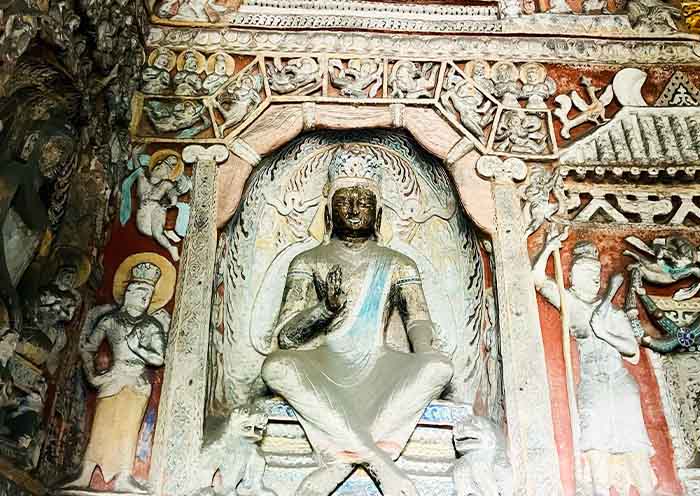
With over 59,000 Buddhist statues and 252 caves, these grottos feature vibrant frescoes created using local and imported pigments from Central and West Asia via the Silk Road. Despite facing destruction and fires over the centuries, the grottoes have persevered. The small holes dotting the statues are the ongoing restoration work carried out by skilled craftsmen since ancient times.
Hanging Temple (悬空寺): Hanging Temple, built during the Northern Wei Dynasty in the 5th century, is a famous cliffside temple in China. It's unique in that it's dedicated to Confucianism, Buddhism, and Taoism. Perched on a sheer cliff, it appears to float in mid-air.
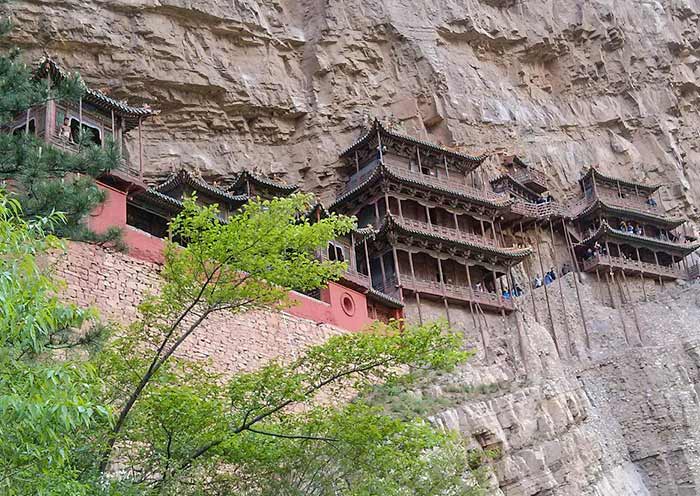
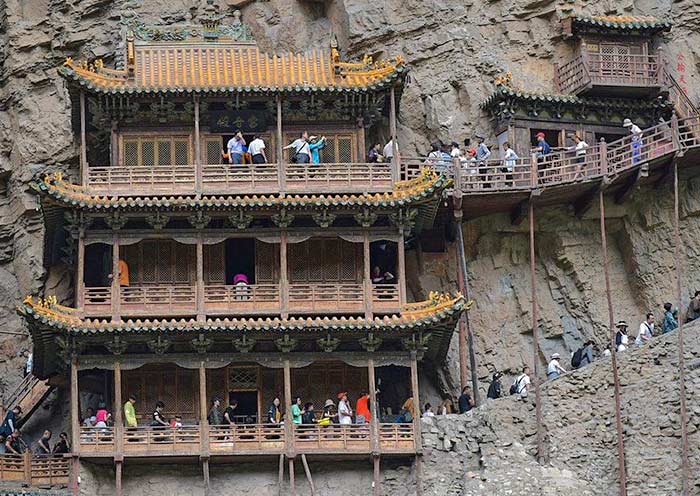
Supported by 27 horizontal beams inserted into holes carved into the rock face, the temple is an engineering marvel. Ancient craftsmen employed a clever technique by inserting wooden wedges into the beams, causing them to expand and wedge securely into the rock. This ingenious method has kept the temple suspended for over 1500 years, demonstrating an early understanding of the principle behind modern expansion bolts.
Pingyao Ancient City (平遥古城): This is one of the most intact ancient county towns in China, showcasing well-preserved city walls, streets, government buildings, financial institutions, and religious sites. The city's prominence during the Ming and Qing dynasties is often attributed to the innovative Shanxi merchants who established China's earliest banks, leading to the city's legendary wealth.
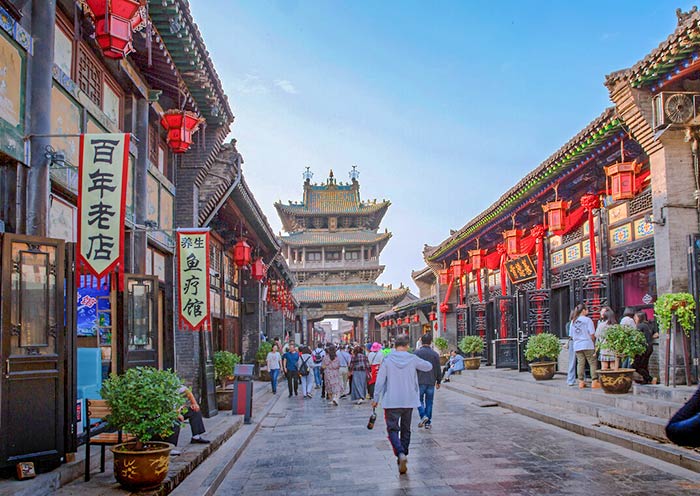
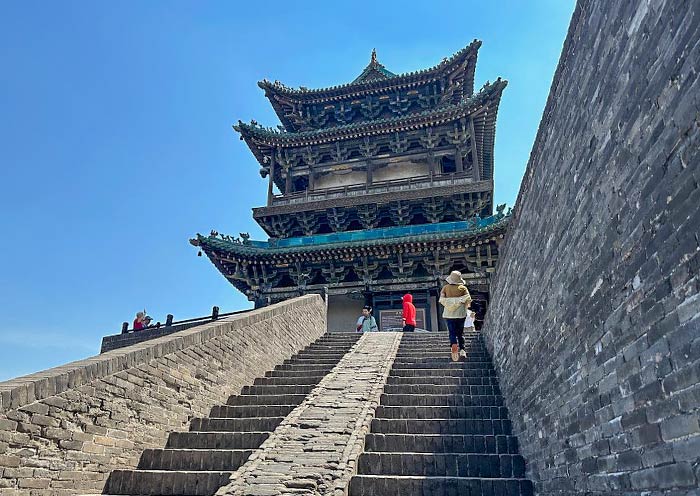
Wang Family Compound (王家大院): Known as "China's Folk Forbidden City," the Wang Family Courtyard is a magnificent architectural ensemble that was once the home of a wealthy Shanxi merchant family. Originating from humble beginnings in the tofu business during the 17th century, the family eventually constructed this sprawling estate, covering 250,000 square meters and comprising 123 courtyards and 1,118 rooms.
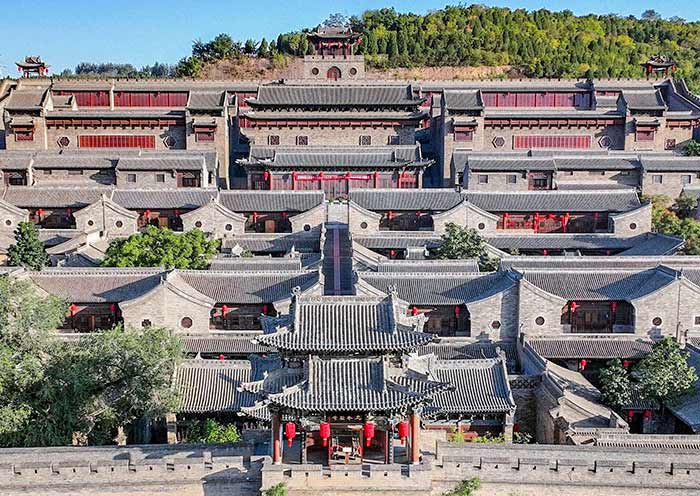

Although the family's fortunes have waned, the courtyard's intricate carvings and grand scale continue to offer a glimpse into China's merchant class. The courtyards are adorned with intricate carvings that impart moral teachings to future generations.
Mount Wutai (五台山): Rising to a height of 3061 meters, Mount Wutai is revered as China's most sacred Buddhist mountain. For Buddhists, it holds a spiritual significance akin to that of Jerusalem for followers of other religions.
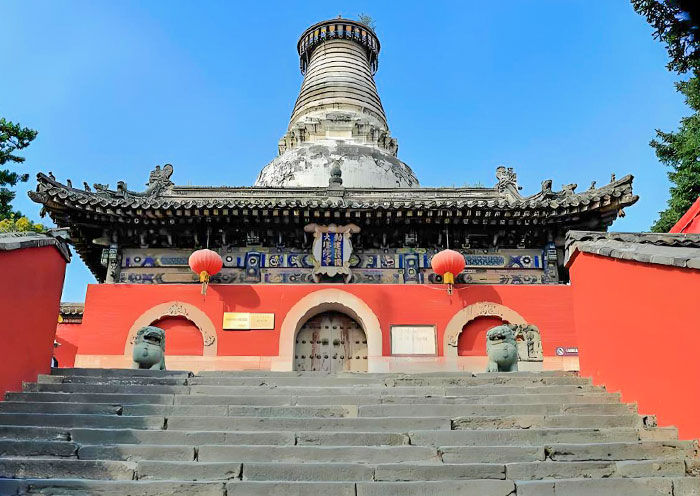
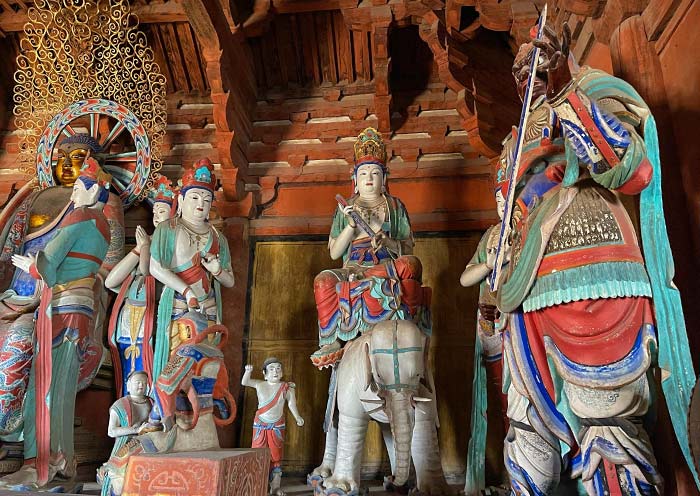
Datong Ancient City Wall (大同古城墙): Datong's ancient city wall is one of the best-preserved in China, dating back to the 14th century. When discussing ancient urban defenses, Datong's wall is undoubtedly a standout. Towering 14 meters high and with a thickness exceeding 15 meters, its sloping design made it a formidable obstacle for countless armies that sought to conquer Datong.
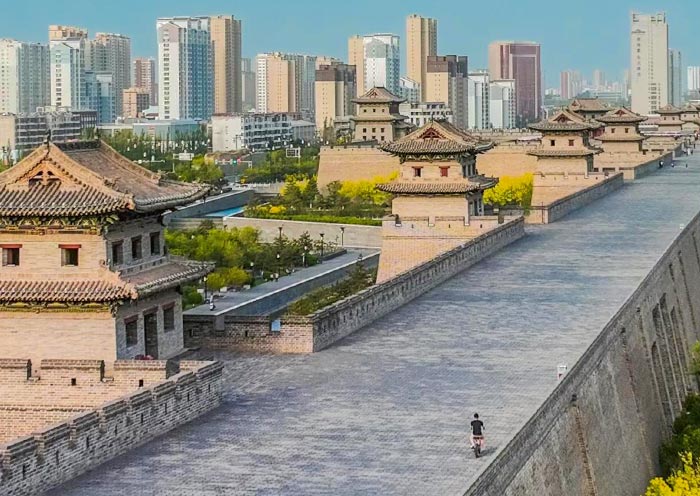
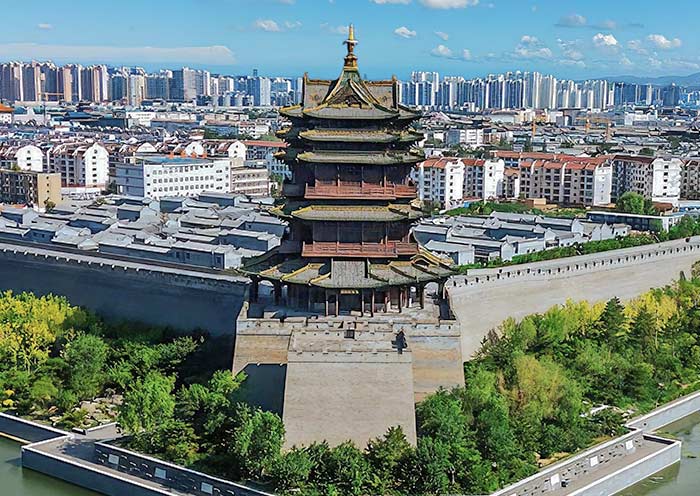
Shanxi Travel Itineraries: How Long to Spend in Shanxi?
The ideal length of your Shanxi trip depends on your schedule and interests. However, drawing on our 13 years of experience in Shanxi travel guide, we recommend allocating at least 4-6 days to fully explore Shanxi attractions like the Yungang Grottoes, Hanging Temple, Mount Wutai, and Pingyao Ancient City.
Recommended Duration of Stay in Shanxi (4 - 6 Days)
As one of China's provinces with a profound historical heritage, Shanxi boasts a vast array of stunning ancient architectures and renowned mountains scattered across its land. It is possible to explore this province within a week. Classic attractions such as the Yungang Grottoes, Nine Dragon Wall, Huayan Temple, Hanging Temple, and Pingyao Ancient City are all included in a Shanxi itinerary.
After immersing yourself in Shanxi's historical sites, consider dedicating a day to experiencing the province's modern transformation and cultural innovation. For example, in a cultural and creative park in Datong, you can savor local snacks that blend traditional craftsmanship with modern flavors and witness new interpretations of Shanxi's intangible cultural heritage. Within the ancient county of Taiyuan, browse unique shops and wander through contemporary art galleries, experiencing a unique blend of the old and the new.
For a more off-the-beaten-path experience, spend a day cycling through the countryside of Jinzhong and exploring undeveloped ancient villages such as Zhangbi Ancient Fortress and the tranquil rural areas surrounding Wang Family Compound. These places retain Shanxi's most authentic rural charm.
Suggested Shanxi Itineraries (4 Days, 6 Days)
Discover the Shanxi's ancient architecture on a 4-day tour. If you're looking to nature landscape on your journey, extend your trip to 6 days.
4 Days Shanxi Tour
What to See: Yungang Grottoes, Nine Dragon Wall, Huayan Temple, Hanging Temple, Yingxian Wooden Pagoda, Pingyao Ancient City, Zhangbi Ancient Castle, Wang Family Compound.
Upon arrival in Shanxi, you can spend 4 days to explore its ancient architecture. For instance, at the world-renowned Yungang Grottoes, you can discover every lifelike Buddhist statue and feel the solemn atmosphere as if returning to the prosperous era of Buddhism. At the Hanging Temple, suspended precariously on a cliff face, you can experience both tranquility and excitement. In Pingyao Ancient City, one of China's best-preserved ancient counties, you can wander through ancient walls, streets, and courtyards, as if stepping back in time to the Ming and Qing dynasties. At the Wang Family Compound, often referred to as the "Folk Palace," you will be amazed by the opulent mansion of an ancient family and its countless exquisite carvings.
After exploring the major tourist attractions, if you wish to delve deeper into imperial and folk architecture, consider visiting the Nine Dragon Wall, Huayan Temple, and Zhangbi Ancient Castle.
6 Days Shanxi Tour:
Attractions: Yungang Grottoes, Nine Dragon Wall, Huayan Temple, Hanging Temple, Yingxian Wooden Pagoda, Mount Wutai, Jinci Temple, Pingyao Ancient City, Zhangbi Ancient Castle, Wang Family Compound.
For those seeking breathtaking natural landscapes, a 2-day trip to Mount Wutai is highly recommended. Enjoy the crisp mountain air at altitudes exceeding 3,000 meters and keep an eye out for the playful wild foxes that inhabit the area. If you're interested in royal gardens used for both religious ceremonies and sporting events, a visit to Jinci Temple is a must. Other than these additions, the itinerary remains similar to the 4-day architectural tour.
What Documentation Will Your Need to Travel Shanxi?
Don't forget your document before you go to Shanxi. Check the following Shanxi travel tip.
Travel Visa: If you or your friends are coming to Shanxi China for a visit, you can get an L visa. It's really convenient because Taiyuan Wusu International Airport in Shanxi offers visa on arrival. So, if you're planning to travel to Shanxi, you don't have to worry about getting a visa beforehand. Just fill out the application form when you get there.
According to the latest travel requirements, you'll need to prepare the following documents in advance for your visa application:
- Original passport and a copy of the information page.
- A recent passport-sized photo. Specific requirements include: 2 inches, taken within the last 6 months, color, against a white background, headshots only, with dimensions of 48mm x 33mm. The head should be 15-22mm wide and 28-33mm long.
Passport: Your passport needs to be valid for at least 6 months after your departure date and have 2 blank pages.
If you have any further questions, please feel free to contact Asia Odyssey Travel, our expert on Chinese tourism.
Shanxi Travel Guide: When to Visit Shanxi?
If you can't stand the heat, Shanxi's spring (March to May) and autumn (September to November) are perfect for you. Shanxi's high average elevation results in a dry and cool climate during these seasons. Even with heavy luggage, you'll find the weather comfortable as you travel between attractions. However, due to the dry air and strong winds, be sure to bring some moisturizing products.
If summer (June to August) is the only time you can visit, don't worry! Mount Wutai is a popular summer retreat, and the Yungang Grottoes offer a cool respite from the heat.
Shanxi Travel Guide: Shanxi Maps
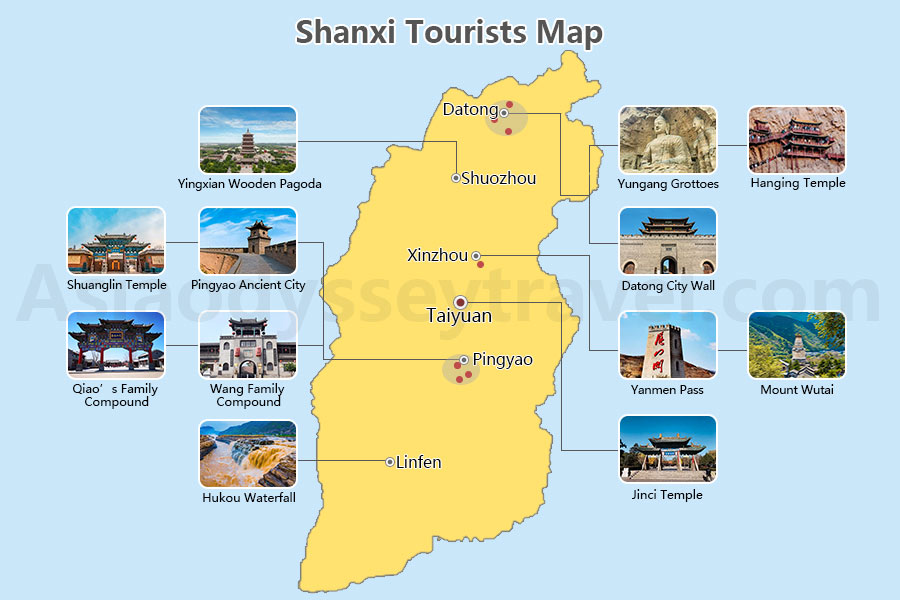
Check more Shanxi Maps.
Shanxi Travel Guide: How to Get to/around Shanxi?
Get to Shanxi
By Flight: Taiyuan Wusu International Airport is the primary international airport in Shanxi Province. Major domestic cities such as Beijing, Shanghai, Chengdu, Chongqing, Nanjing, Kunming, Guangzhou, and Shenzhen, as well as international destinations including Bangkok, Nha Trang, and Sydney, offer direct flights to Taiyuan.
By Train: Shanxi is a significant hub in China's high-speed rail network. Taking a high-speed train from Beijing to Shanxi is the quickest and most convenient way to travel.
Beijing to Datong Train & Flight 2026 (Distance Included)
Beijing to Pingyao Train (3-4h): Map, Schedule, Ticket, Booking (2026)
Beijing to Shanxi Taiyuan Train: Railway Stations, Schedule, Fare
Beijing to Wutaishan: 3 Ways via Bus, Train, Flight 2026
Get around Shanxi:
By High Speed Train: Shanxi's major tourist destinations, including Datong, Pingyao, Taiyuan, and Linfen, are conveniently linked by high-speed rail. This is the quickest way to travel within the province.
By Bus: Bus travel is another popular option for getting around Shanxi. Most tourist destinations can be reached by bus within 5 hours or less.
By Private Car: Shanxi's varied terrain and dispersed attractions make self-driving challenging, as roads can be long and confusing. To avoid getting lost, it's advisable to hire a private car with a local driver, especially if you're unfamiliar with the area. Contact Asia Odyssey Travel for private car.
Datong to Wutaishan: 3 Ways via Bus, Driving, Train (2026)
How to Get from Pingyao to Datong: by Train & Car
Pingyao to Xian High Speed Train: Timetable, Facilities, Travel Plan
Get from Taiyuan to Pingyao: by Train & Private Car 2026
Shanxi Travel Guide: What is the Food of Shanxi?
Then our Shanxi travel guide comes to Shanxi food. Shanxi is renowned for its noodles, and knife-cut noodles are the epitome of Shanxi cuisine. A trip to Shanxi without trying knife-cut noodles would be a real miss! Skilled chefs use their masterful knife skills to slice the dough into paper-thin noodles that are cooked in a delicious broth, creating a chewy and satisfying texture.
After a hearty meal, treat yourself to some unique local drinks and desserts. You won't find coke and ice cream with vinegar anywhere else but Shanxi. The sweet and sour combination is a one-of-a-kind flavor experience.
Extend Your Shanxi Trip with Asia Odyssey Travel
The cities closest to Shanxi in China are Beijing and Xi'an. Asia Odyssey Travel, with 13 years of experience in Chinese tourism, can help you quickly discover the must-see highlights of your trip, arranging tickets and itineraries. Our experts will tailor a personalized itinerary to your specific interests and preferences.
Popular Destinations Nearby Shanxi:
Beijing: Tian'anmen Square, Forbidden City, Summer Palace, Mutianyu Great Wall, Bird's Nest & Water Cube.
Xian: Terracotta Warriors, Ancient City Wall, Muslim Quarter, Grand Tang Dynasty Ever Bright City, Small Wild Goose Pagoda, Xian Museum.
Other Hot City Tours:
